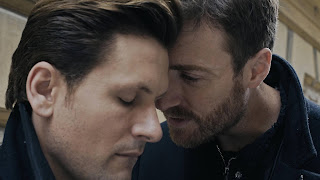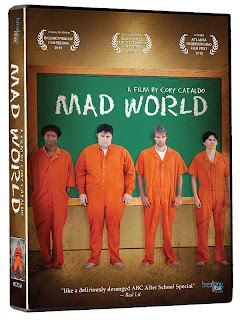Movie Review - The Obituary of Tunde Johnson (Outfest 2020)
Kalu's script is actually three things at once. It's a queer love story or queer coming-out story first. It's a Black Lives Matter movement story second. Except, it's not second. The Black Lives Matter story here is primal and just as fundamental as the queer aspects. The third thing that this film is being is a take on the idea in the hit film Groundhog Day (1993). Ever since that 1993 comedy, many films have copied its central idea, that of the time-loop, where we see a character repeat the same day and same events over and over. The past five years or so in particular have seen an increase in these types of time-loop films or TV shows. This past year has seen so many examples, such as Palm Springs (2020) or "Try, Try" in the second season of The Twilight Zone (2019) or "As I Have Always Been" in the seventh season of Agents of S.H.I.E.L.D. (2013). All of them have different tones, but a few things in common. This film though tries to do something a bit different.
Steven Silver (Council of Dads and 13 Reasons Why) stars as Tunde Johnson, a young black man who is currently attending college at UCLA. He is the son of Nigerian immigrants who have come to the United States either as a wealthy couple or as a couple that then became very wealthy. Either way, Tunde's parents are rich and he lives with them in an affluent neighborhood. He's studying film at school, but he has a computer in his room with expensive, filmmaking software on it. He also drives a fancy car to school and back. His only problem would seem to be that he's gay and he hasn't come out the closet and told his parents or his friends at school. This is a problem mainly because Tunde has been in a relationship for six months with a guy and being secret about it is becoming increasingly untenable.Spencer Neville (Good Trouble and Days of Our Lives) co-stars as Soren O'Connor, a lacrosse player who is a fellow student at UCLA. In fact, he's in one of Tunde's film classes. Soren has a girlfriend who is an aspiring actress and probably is the hottest girl in school. His friends are all jocks who play lacrosses or other sports. Soren is one of the most popular athletes on campus. Except, none of them know that he too is gay and that he's been Tunde's secret boyfriend. The reason Soren is in the closet, despite living in Los Angeles in the year 2020, is because his father is a conservative, right-wing pundit on primetime television. His father is presumed to be a Sean Hannity-type who has probably expressed somewhat anti-gay opinions on national television, so it makes Soren afraid to be honest.
Tunde's problem is that he doesn't want Soren to be afraid. He wants him to be honest. Tunde wants to be honest too because it's not just that he's keeping quiet. He's lying as Soren's girlfriend is also Tunde's best friend. He's lying to her about the fact that he's having an affair with her boyfriend behind her back. Tunde wants to get Soren to reveal the truth to everyone before the end of the night. He's really insistent on that point. One doesn't get the urgency behind Tunde's insistence, but one reason could be because Tunde knows he's in a time-loop and like the character in Groundhog Day believes Soren's telling the truth might be the thing to get him out of it.However, Tunde never says that or speculates that, which is how this narrative diverges from other time-loop films. In other time-loop narratives, the character who is experiencing the loop realizes he's in a loop and comments upon it to someone eventually. Tunde seemingly realizes that he's in a loop but he never comments or talks about it to anyone, as a way to reconcile it. Aside from getting Soren to come out to people, Tunde doesn't seem to do anything to get out of the loop, which is an aspect of other time-loop films. The characters try to escape or do things to change what is often a repeated experience. Tunde doesn't seem to try to escape or change things in certain ways. He might be, but it's not totally clear.
At first, Kalu's screenplay doesn't seem like it's a time-loop. The story at first feels like it's repeating not due to narrative reasons but simply as a structural tactic. We see Tunde live out his day. He then goes back and relives the same day, the exact same day, doing the exact same things all over again. At first, it doesn't seem like he traveled back in time. It just seems like the film is simply replaying the same events, while revealing different perspectives, akin to Rashomon (1950). In that, it feels as though Tunde isn't actually reliving the day. We're just seeing him do so without that being a narrative thing. However, later it seems as if Tunde actually is in a time-loop because he does things that would suggest in a subtle, blink-and-you-miss-it way that he is conscious of the repeated, past events, but his actions don't seem to conform to that unreality, except in moments where he's frustrated or saddened by the fact that he has to go back and relive the whole thing.What adds to his frustration and sadness at having to relive the same day is the fact that the day he's reliving is the last day he's alive. At the end of the day, Tunde is murdered. A police officer kills him in what is an incident akin to numerous Black Lives Matter cases. Therefore, every time Tunde relives this day, he's reliving his own murder over and over. This film then becomes Groundhog Day meets Fruitvale Station (2013). Except, there already was a film that did that. It was called See You Yesterday (2019). That film was about the seemingly futile effort to avoid or fight back against these extrajudicial killings of unarmed black men at the hands of police. The characters tried to find ways to stop the killing. Yet here, Tunde doesn't really take active steps to avoid his own death, which he presumably knows is coming at the end of each night.
This clearly must be a choice on the part of the filmmakers to show us the brutality, the randomness, the racism and the outright, egregious and unfairness of these Black Lives Matter cases. Every time Tunde is killed, it is in a slightly different fashion or by a different cop, which suggests that Tunde can affect the situation and its outcomes, but he never expands on that. Most of the times, he's shot, but he loses his life in other ways, including in a way that is remarkably similar to how George Floyd lost his life this year, even though this film premiered at last year's Toronto International Film Festival. Layered over top is narration that sounds as if a guy is literally reading from the obituary section of the newspaper.It's very clever how the filmmakers weave this gay coming-out story, which is an oft-told and cliché narative, into the Black Lives Matter movement, using the queer love and fear as a metaphor and tool to tell the Black Lives Matter story, which I never would have thought to do, but is powerful in its execution here. Silver's performance as this gay black man in the center is also quite powerful. It might be disturbing to see him die over and over, in a way that's not supposed to be as it was in something like Happy Death Day (2017) or Edge of Tomorrow (2014). It's not just an indictment of the cops who are protrayed here in almost cartoon fashion. It's also meant to be an indictment of the audience or else a call to arms, echoing a point that Tunde makes about The 400 Blows (1959), when he says you are not looking at film, film is looking at you.
Not Rated but contains violence, language, nudity and sexual situations.
Running Time: 1 hr. and 43 mins.
Streamed through OutfestNow.















Comments
Post a Comment